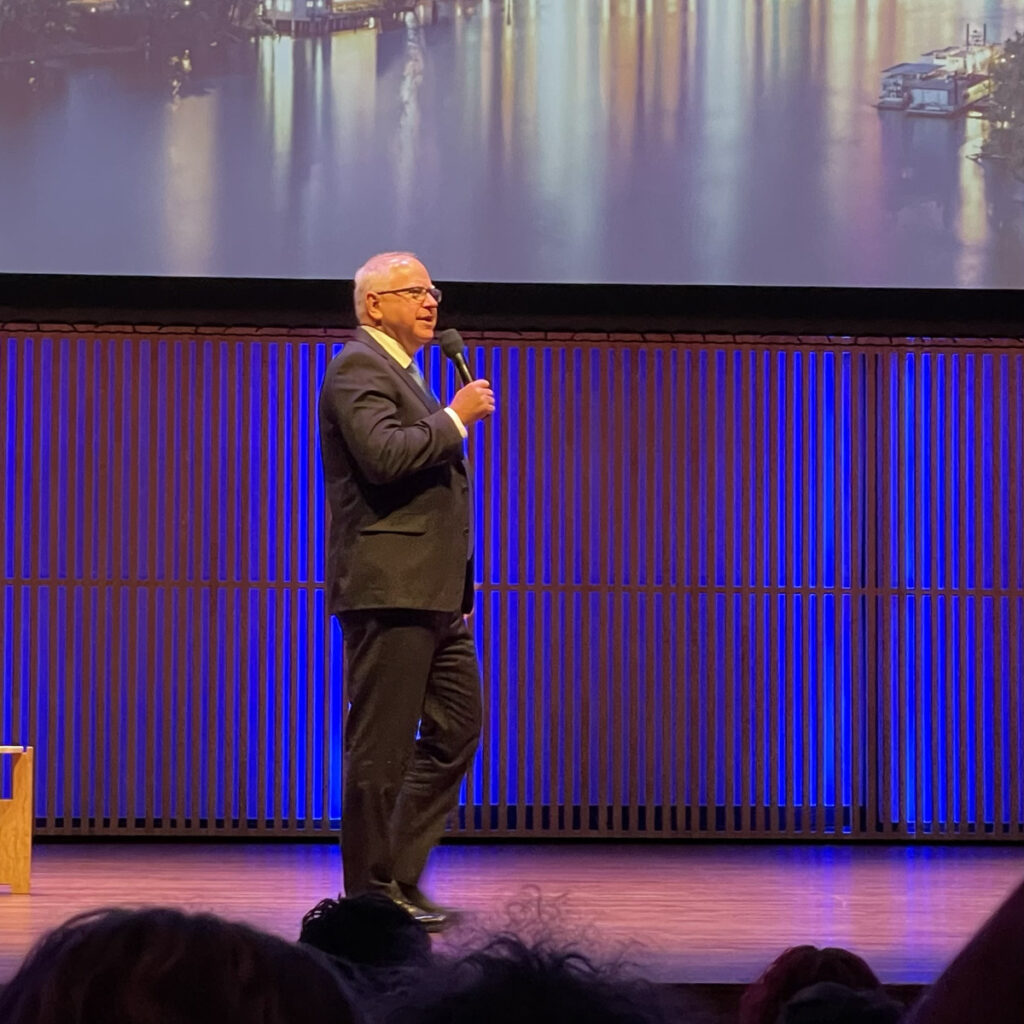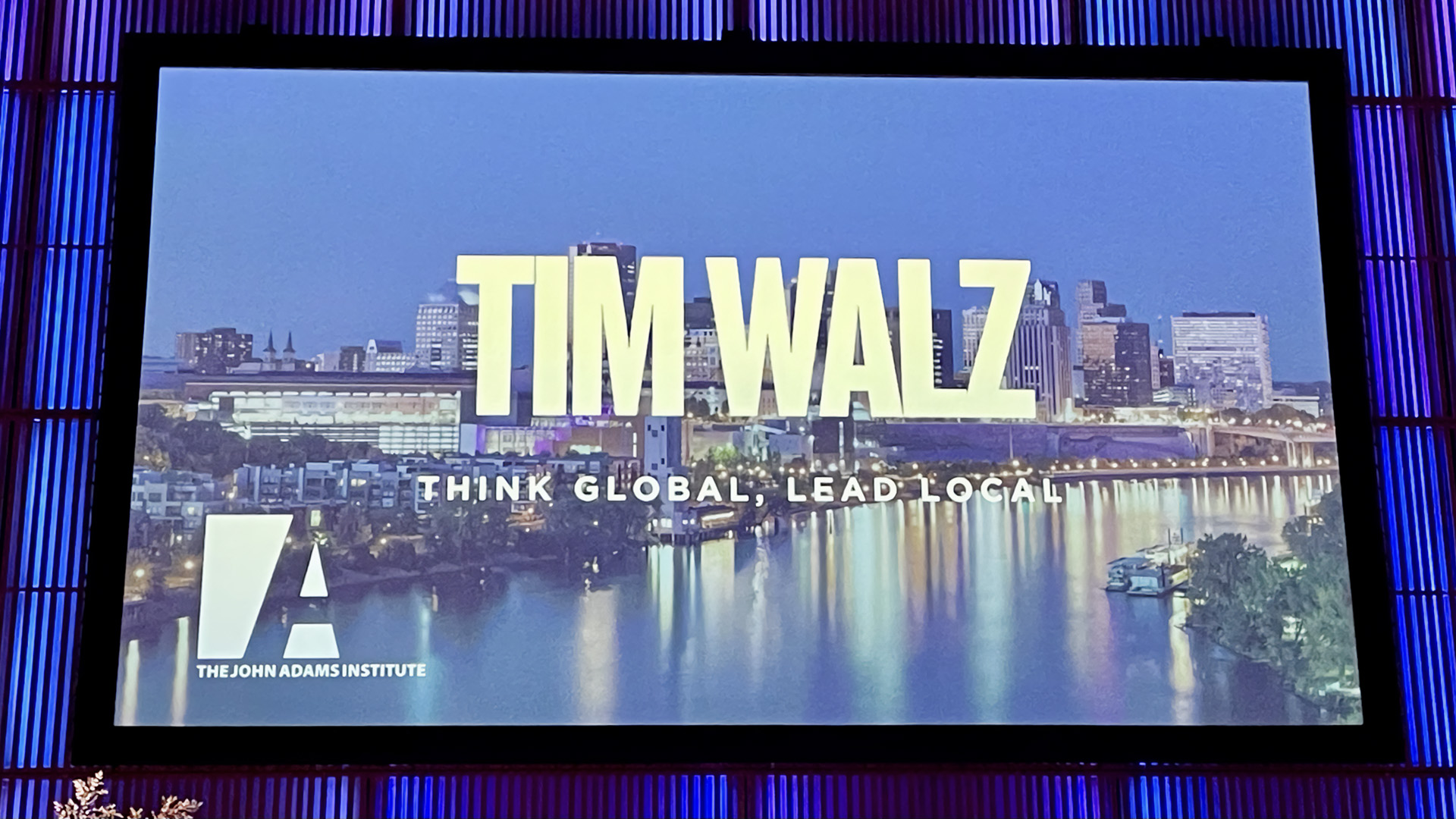Yesterday, I attended an evening event with Tim Walz, US governor of Minnesota and former running mate of Kamala Harris for the 2024 American presidential election. Then, unknown to most people in Europe, where his name suddenly appeared in news reports from Washington DC, now Walz still remains an unfamiliar figure to many, except perhaps for those who know his background as a teacher, coach, and politician. He was visiting the Netherlands as part of a business development mission.
Walz’s motto, “We all do better when we all do better”, adopted from Senator Paul Wellstone and regarded as Minnesota’s unofficial state philosophy, is a leading theme in the state’s approach to being the best place to raise a family. By adhering to this philosophy, Minnesota’s policies on education, economics, healthcare, and social justice have helped the state rank among the best in terms of wealth, health, and happiness. And Walz is actively connecting with others around the globe in an effort to stay on top of it, like here in The Netherlands, with, among others, a visit to Brainport.
When I interact with foreigners in our country and those new to Brainport Eindhoven — the southern Netherlands region renowned for its strong innovation, technology, and design ecosystem — about our typical flat-hierarchy ‘polder-model,’ I explain how companies, government, institutes, and society work together from a consensus perspective. This approach fosters greater buy-in, gains wider support, and generally builds a more inclusive and sustainable structure. It’s difficult to envision a world where such a philosophy wouldn’t survive or couldn’t thrive. This kind of positive and uplifting collaboration generally is reciprocal and beneficial beyond merely the transactional.
I returned home, appreciating the logic behind Walz’s business development mission and his perspective on building strong partnerships, which seems to align beautifully with the Brainport approach. While the evening left me inspired about how states and countries can collaborate to improve their citizens’ wealth, health, and happiness, I couldn’t help but contrast this with the current political climate. The most recent press conferences and public statements from the Trump administration suggest a parallel universe where truth, decency, inclusion, and cooperation seem to hold little value. Not only did the audience get some insights into this positive person, but also the positive politics behind collaboration.
Usually, I avoid writing about politics and refrain from posting stories or articles on open social media platforms when it isn’t tied to my professional activities. I prefer a non-divisive approach to business and politics — one that doesn’t depend on conflict and power plays, but rather builds on the guiding principle that ‘we can all do better,’ working towards the betterment of all involved.

Key takeaways from the evening:
Apart from the obvious references to Trump and the state of today’s world, I listened to the things being said about serving a community, defending policies to improve the lives of people, and cooperation across borders:
- Have an open mind to and interest in what happens on a global scale, but apply what you learn to your local situation. Form partnerships that strengthen your common goals and act with a moral compass. When you work with the community and for the community, you increase the probability of being successful in the long run. A short-term gain might seem tempting, but in the end, it will not bring sustainable business or lasting policies that bring broader benefits to those that need it most.
- Be cautious of global disruptive politics, be careful not to accept misleading practices, and question actions that only enrich the entitled few. Decency and morality have a place in both politics and business practices alike. Losing these values will lead to a decline in trust and support. And always be open to criticism; own your shortcomings and learn from your mistakes. We can all do better.
- Even if, on a global scale, international politics seems to be on a crash course, there is still a majority of people, companies and countries that are willing to unite, cooperate and build a better future. In the current political climate, states like Minnesota and countries like The Netherlands can work together on a local scale, advancing local communities.
For what it’s worth, on a personal level, I seem to have connected the dots between the “Minnesota way” and the Brainport vision. With the EHV Innovation Cafe, however small in comparison to intercontinental cooperation endeavours, as a local initiative it is connecting people, technology, and design to fuel transformation, which is key to fostering collaborative networks. The campus ecosystem, the open innovation culture, the Dutch Design Foundation, an international community; all these Brainport-based building blocks lead to a strong foundation to build upon.
For what it’s worth, on a personal level, I seem to have connected the dots between the “Minnesota way” and the Brainport vision. With the EHV Innovation Cafe, however small in comparison to intercontinental cooperation endeavours, as a local initiative it is connecting people, technology, and design to fuel transformation, which is key to fostering collaborative networks. The campus ecosystem, the open innovation culture, the Dutch Design Foundation, an international community; all these Brainport-based building blocks lead to a strong foundation to build upon.
https://www.linkedin.com/pulse/evening-tim-walz-roland-biemans-c0lce

Comments are closed